Screen time: How it impacts the wellbeing and learning of children with SEND

The House of Commons (HoC) Education Committee is demanding tougher formal restrictions and guidelines to protect children from screen time after their Screen Time: Impacts on Education and Wellbeing report found that it has a significant impact on young people’s education and wellbeing.
Chair of the Education Committee, Robin Walker MP said: “Our inquiry heard shocking statistics on the extent of the damage being done to under-18s, particularly those who are already extremely vulnerable, such as those in care. Without urgent action, more children will be put in harm’s way.”
The Data
For anyone working in education, or those who are parents themselves, it’s likely unsurprising that screen usage has increased, with significant screen time being found to start as early as six months of age.
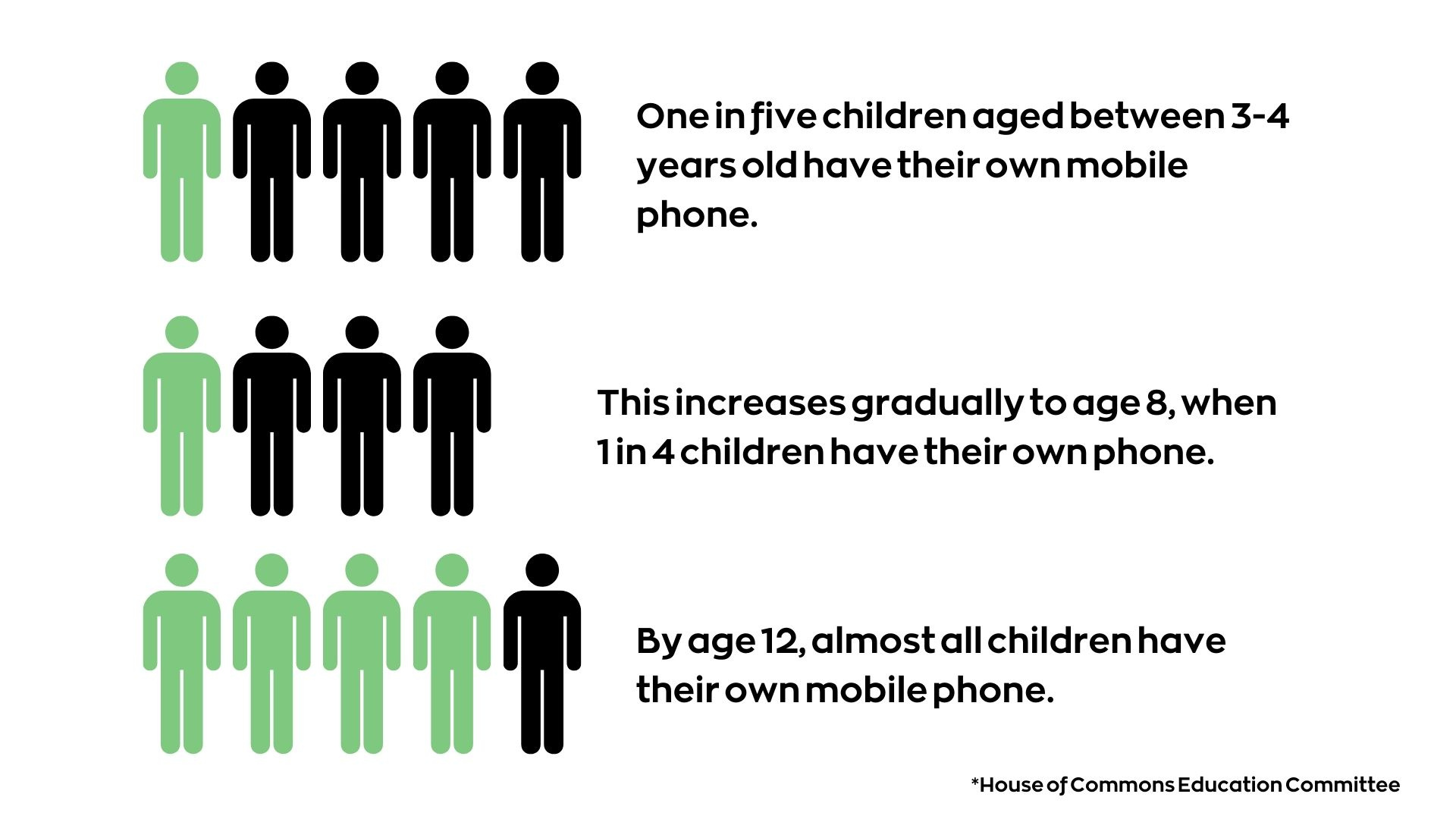
*Statistics from the HoC Education Committee report
The amount of time children and young people spend on screens has increased significantly over the last decade, increasing from 9 hours per week to 15 between 2009 and 2018. According to data collected by the Independent, screen time for 11- to 14-year-olds can be as high as 9 hours a day. But how does this affect mental wellbeing, learning and safety?
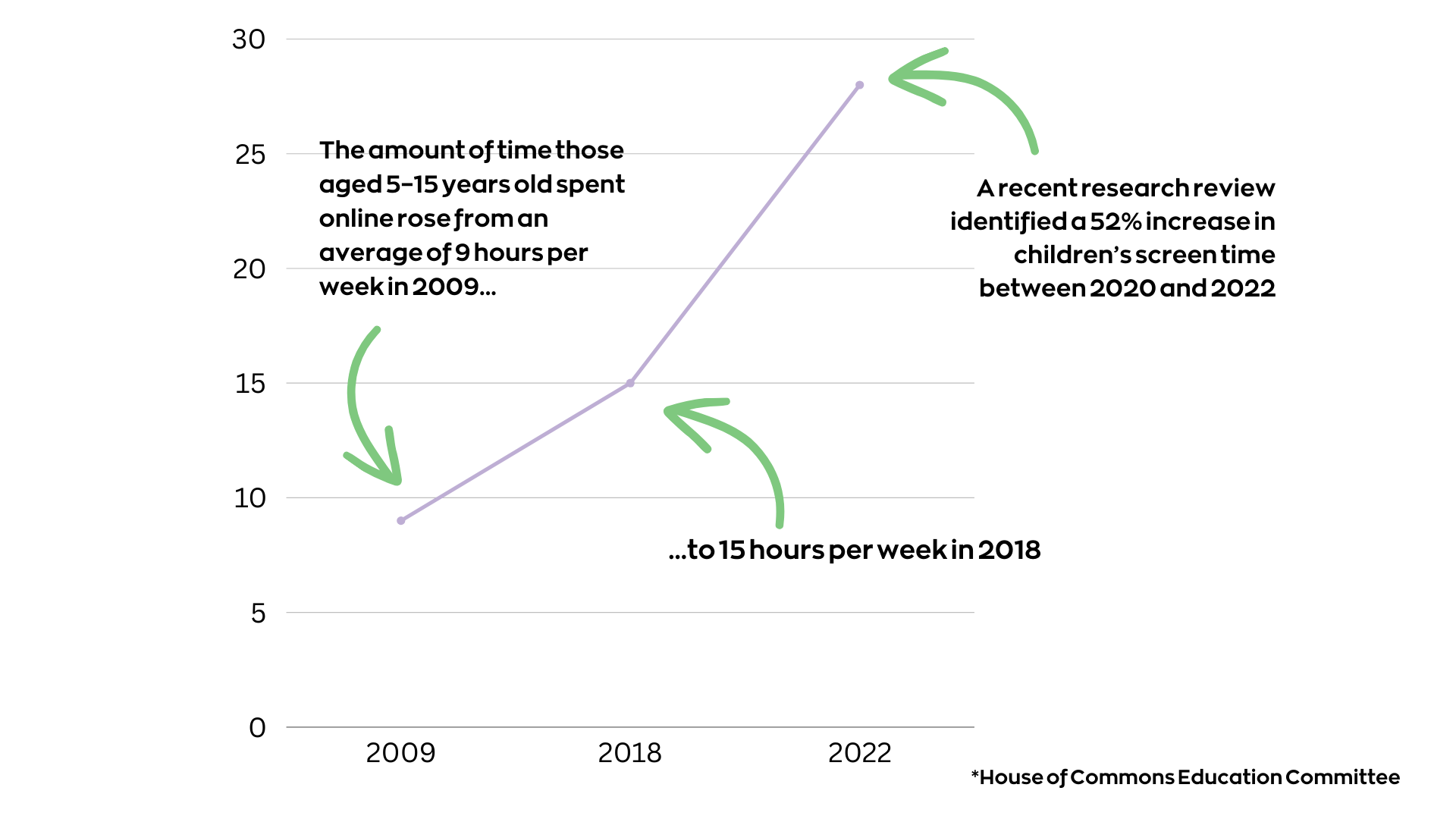
*Statistics from the HoC Education Committee report
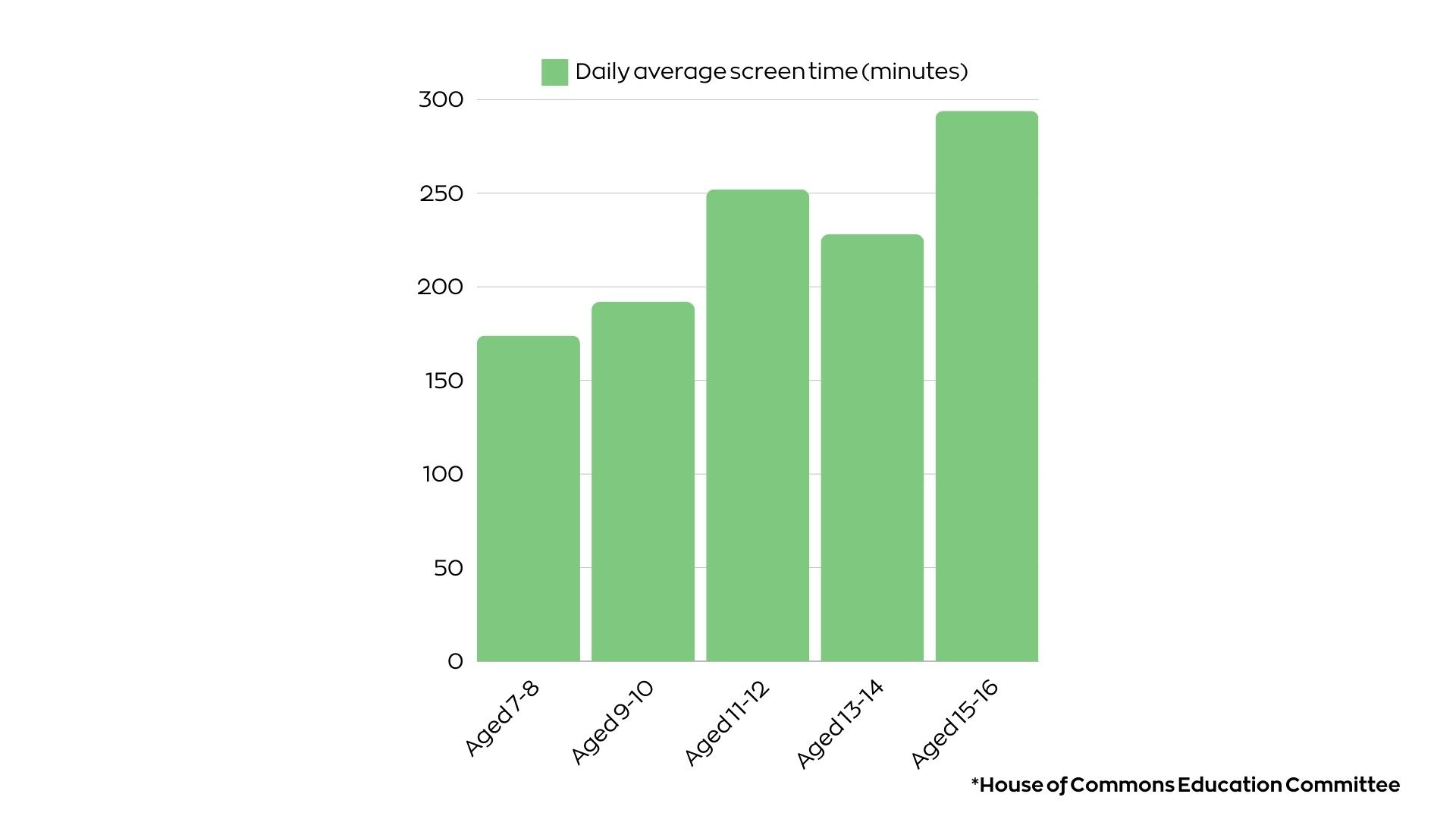
*Statistics from the HoC Education Committee report
Brain development and learning
The report concluded that screen time can be associated with declining working memory, processing, attention levels and language skills in children. The report said that children who were exposed to longer than two hours a day of recreational screen time were more
During the inquiry period, NASUWT, the Teachers union, also brought up the effect screen time has on concentration in the classroom, stating that it takes around 20 minutes for a student to refocus on a lesson after engaging with their phone.
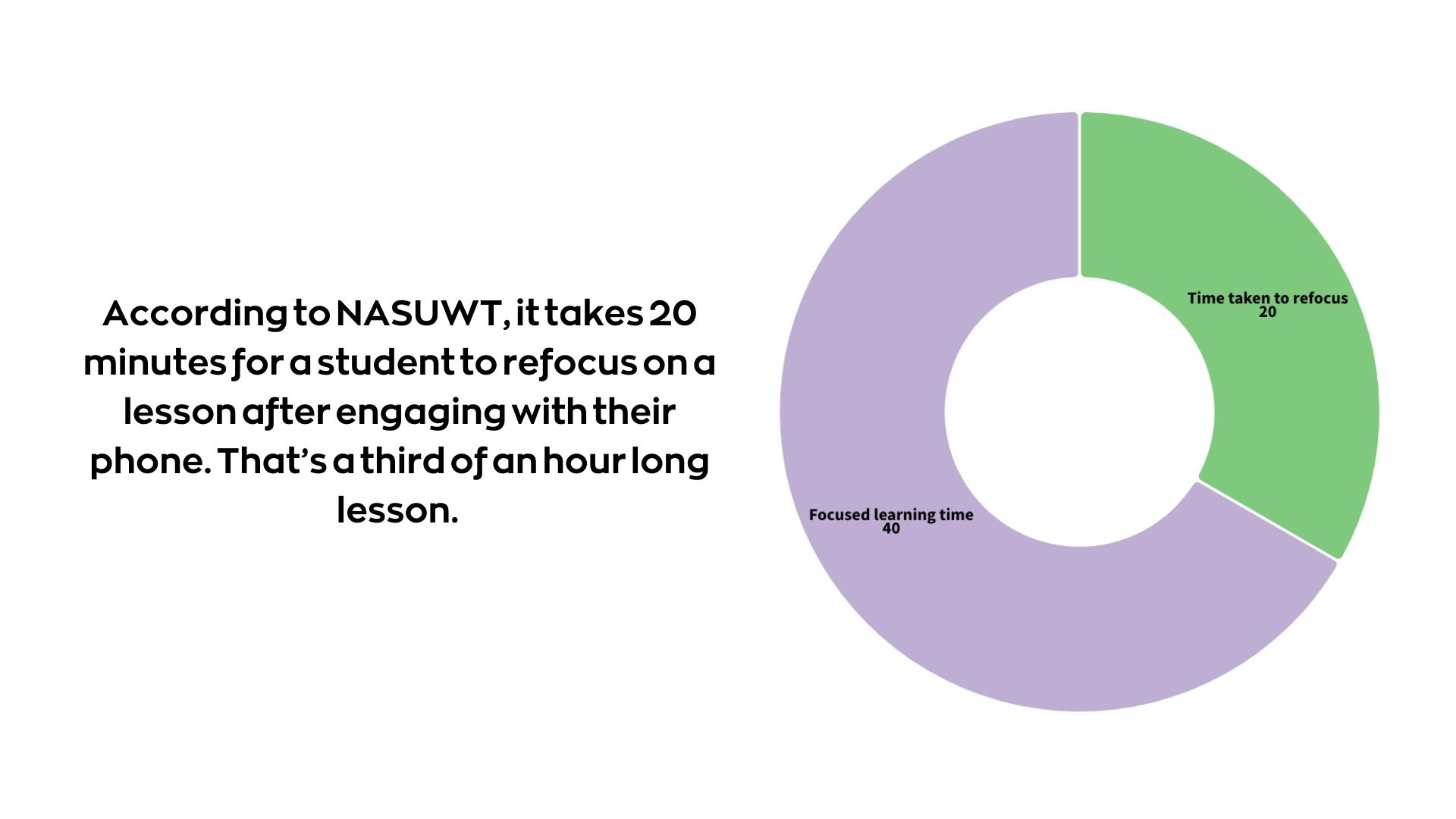
*Statistics from NASUWT, via the HoC Education Committee report
SEND consultant, Lorraine Petersen noted that screen time can be particularly harmful for younger children. Often, mobile phones and tablets are used as “pacifiers” for very young children. Lorraine explained that this can be detrimental to early brain development as the brain needs “a rich vocabulary environment” to properly develop communication skills from an early age. Lorraine added:
A child who arrives in school who has not had this vocabulary-rich environment (something that may not be present if a mobile phone or tablet is regularly used instead of talking or reading to a child) then their learning will be inhibited, and the brain will take longer to process language.”
Lorraine’s concerns echo the Education Committee’s, which concluded that screen time should be minimal for younger children and better balanced with face-to-face socialisation and physical activity for older ones.
Mental health issues
Since 1999, the number of children with mental health disorders has roughly doubled: in 2022 18% of children aged between 7-16 years were deemed as having a probable mental health disorder, compared to 9.7% in 1999.
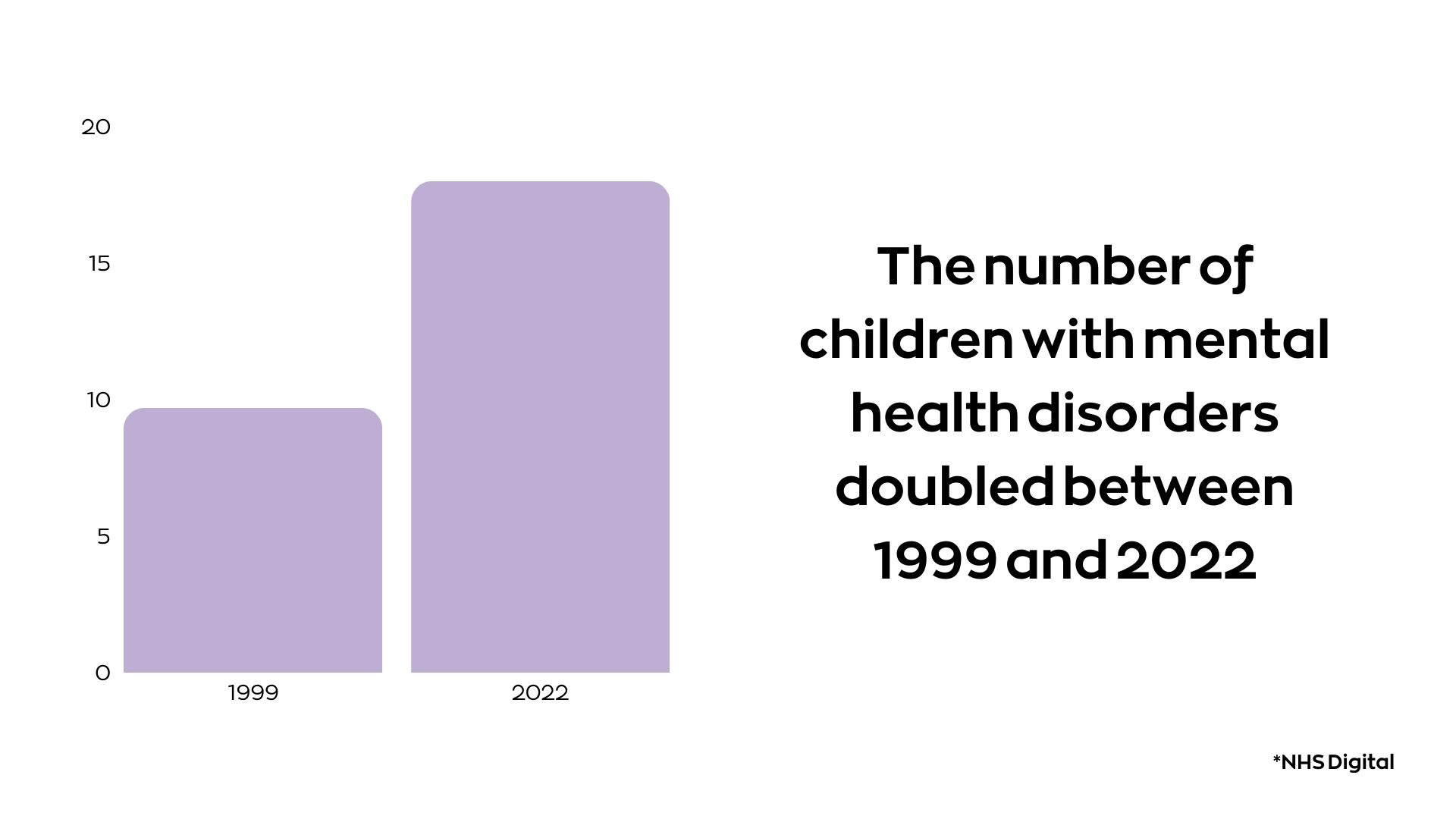
*Statistics from NHS Digital
The Screen Time: Impacts on Education and Wellbeing report found an association between smartphone usage and rising numbers of young people suffering from mental health issues, however were unable to prove a causal relationship between the two.
With the rising use of social media platforms among younger audiences, it is feared that many children and young people face additional pressures, including around body image and self-esteem. According to research released by Meta, using Instagram has made body image issues worse for 1 in 3 teenage girls who already faced body image issues in the UK and US.
Online harms are a high risk for children using screens, the report concluded. Examples included cyberbullying, racism, misogyny and exposure to violent or pornographic images and videos. The British Board of Film Classification found that children as young as 7 were coming across pornography online and 79% of children had encountered violent pornography before the age of 18.
The committee has called for an increase in training for teachers teaching students about digital safety and an increase in the amount this features in the core curriculum. They also suggested the government should produce guidance for parents on how to best manage and understand the impact of screen time on their children.
However, Lorraine Petersen also believes that there is “real urgency” to ensure there is guidance and appropriate advice for children with SEND specifically - something that the report spoke little about - as these online issues that affect mental health impact this group significantly more. She said:
For many students with SEND, the issue is that they do not understand the dangers in the same way as many non-SEND students. They are taught from a very young age, often by older siblings, how to access the internet, social media sites and online gaming without a full understanding of the dangers."
Yasmin Shaheen-Zaffar, founder of Watoto Play, added that children with cognitive impairments in particular can be more at risk online, as they may not recognise potential threats or understand the long-term implications of their online interactions and struggle with communicating concerns to friends and family. Yasmin said:
Children with SEND might struggle to articulate their experiences or concerns about online activities, making it harder for parents, teachers, or caregivers to intervene and provide support. They may also feel they have no one to turn to when feeling shame or the inability to ask for help as they may feel it is their fault or feel they may get into trouble."
To address these difference, Lorraine Petersen believes there needs to be focused guidance for specialist settings and parents. She said "All the guidance both statutory and non-statutory is written with mainstream settings in mind – specialist professionals who understand SEND should be part of the writing of these guidance documents. It would be beneficial if guidance was given to what must be taught and how this can be adapted for different needs – again using SEND specialists to support this.”
Positive impacts for children and young people with SEND
Children with special education needs and disabilities were deemed by the Committee as some of the most vulnerable children to the negative effects of screen time. However, both the report and Lorraine Petersen noted some of the online learning benefits, including:
- Sensory stimulation and focus of interactive games can be a real attraction for some SEND students
- Online education can be beneficial to students whose mental health is impacted by being in school, due to the sensory overload of the busy, noisy nature of a large school
- The opportunity to join an online community of like-minded people
Something that the report did not touch on, however, is how online learning can benefit attendance for students with SEND. Lorraine explained that the government’s current attempts at increasing in-person attendance ignore why many children, particularly those with SEND, avoid school and will not drive up attendance for these students.
She said: “There needs to be a radical look at what school attendance means – is it that a student must have their backside on a seat in front of a teacher to be present? Or could it be that they are at home but online at the start of each lesson and engaged in their learning through technology?”
“This has got to be better than not being in education at all and will lead to an increase in the number of students with SEND as they miss significant aspects of their education.”
Report Recommendations
The committee made several suggestions for the next government to implement regarding screen time and keeping children and young people safe. Here’s a round-up of a few of those recommendations:
- Implement stricter mobile phone bans in schools, including break times.
- Establish a monitoring system to decide on future statutory bans.
- Guide parents on monitoring/reducing children's screen time.
- Increase government efforts to protect children from addiction, online harms, and mental health impacts of device use.
- Revise advice for parents of young children to emphasise face-to-face interaction and warn of screen time risks.
- Develop guidance on the educational value of websites and apps, and work with tech companies on educational standards.
- Offer additional training and support for teachers on digital literacy and online safety.
- Ensure no delays in implementing the Online Safety Act 2023 and work with Ofcom on robust age verification for internet platforms.
It's clear that there are some great ways to use technology to improve learning, especially for students with SEND who may find a busy school setting overwhelming. However, unregulated screen time is where problems arise for children and young people. From the dangers of social media to the decline in working memory and brain development from overuse of devices: more needs to be done to guide parents, educators and students on how to manage screen time and the dangers that children can come across online. Without this, the problems of increased screen time seriously outweigh its advantages.
By Izzy Felton



Please sign in or register for FREE
If you are a registered user on SEND Network, please sign in